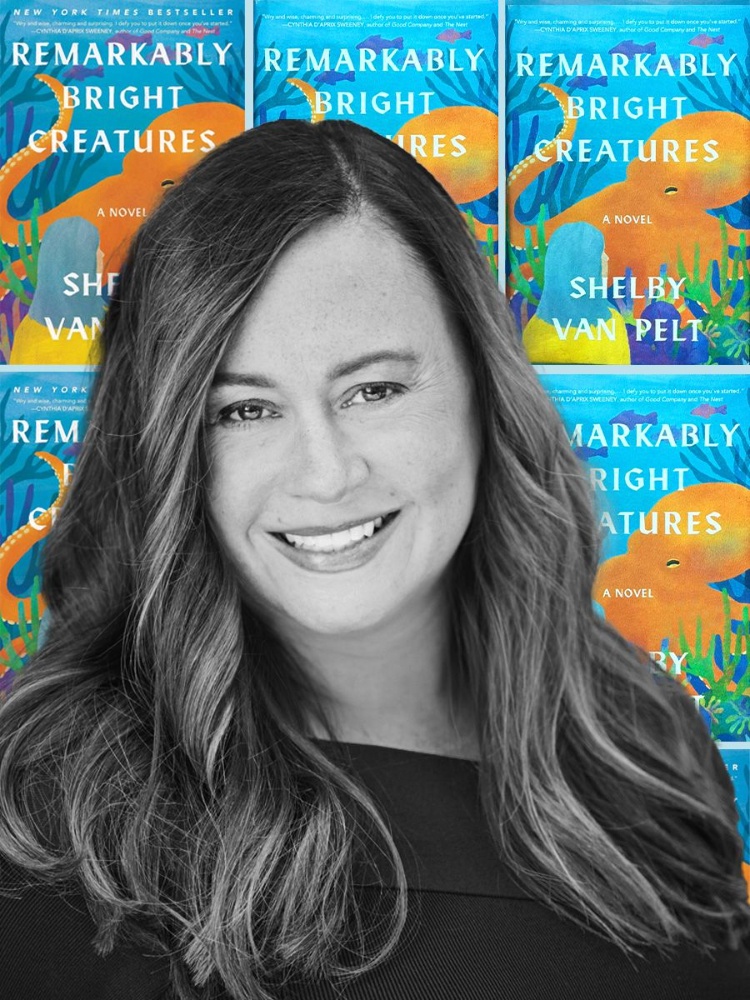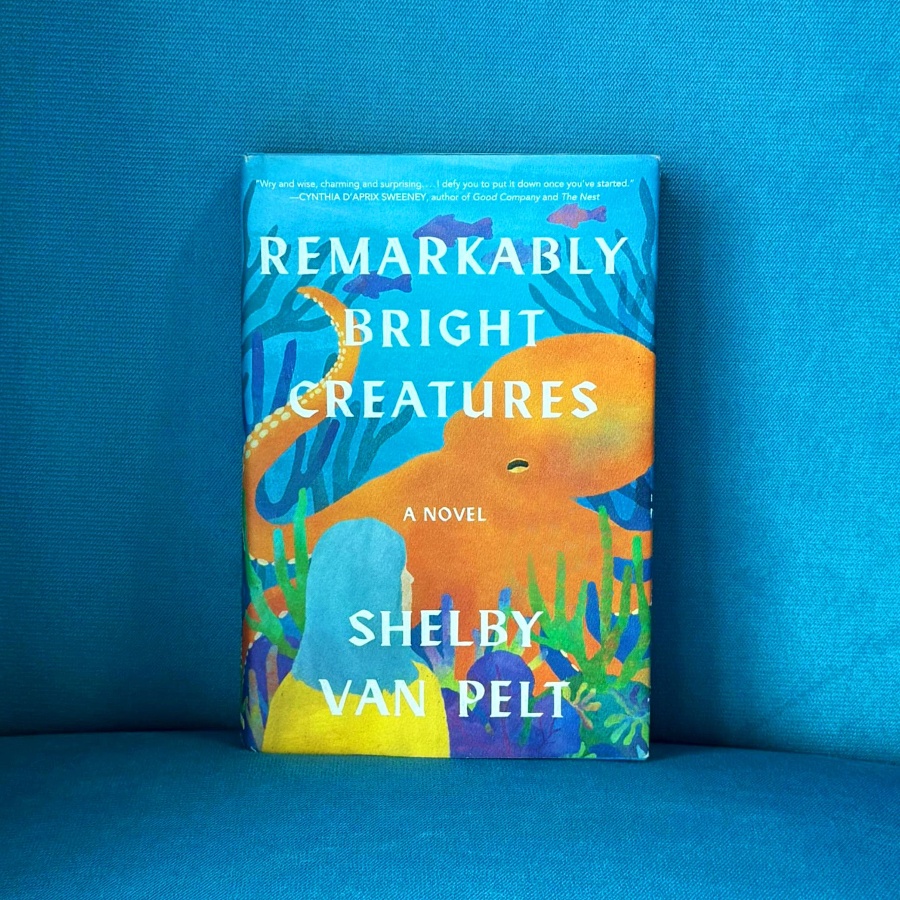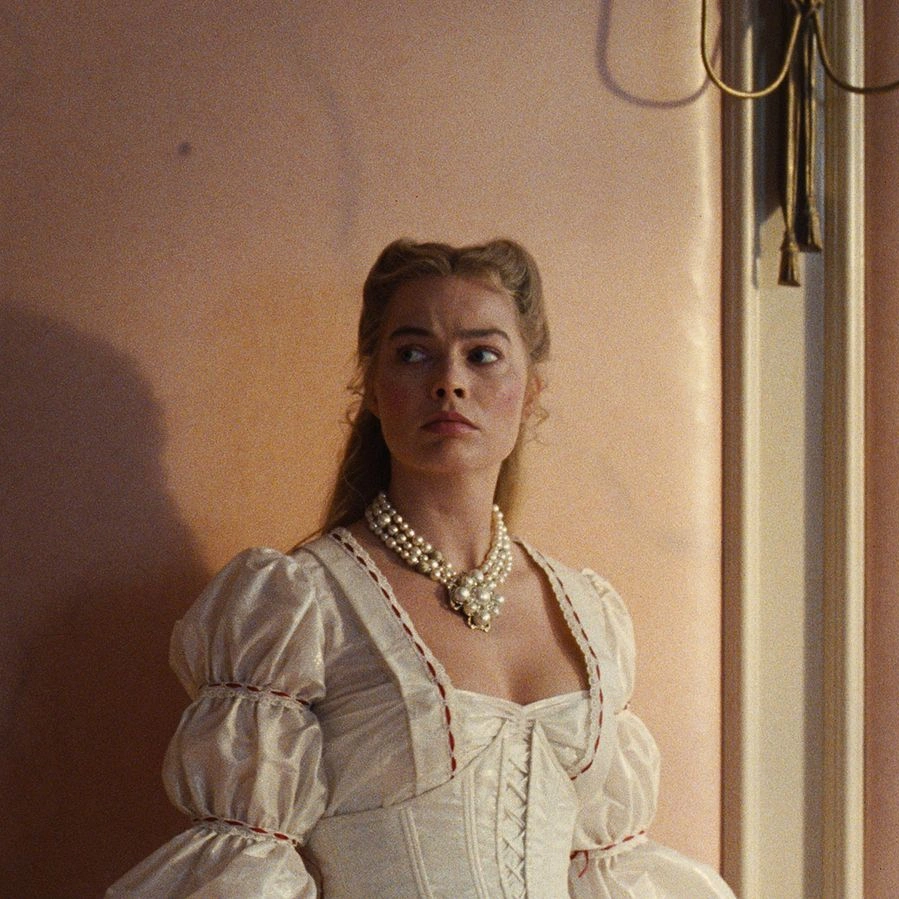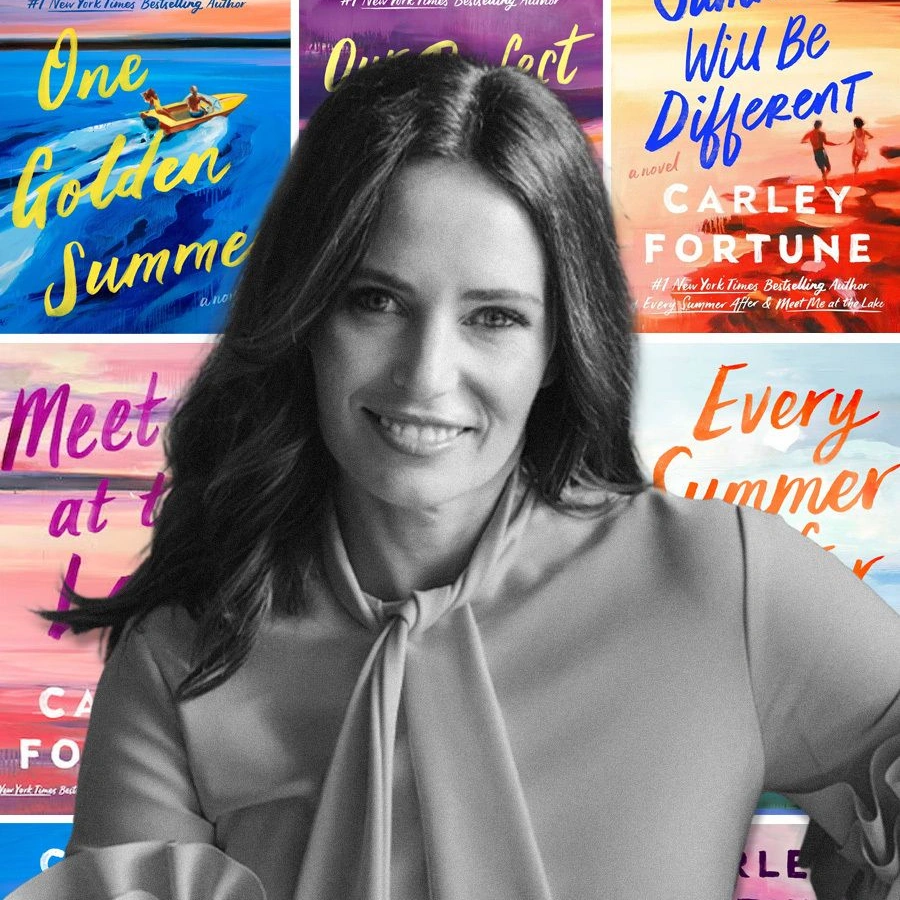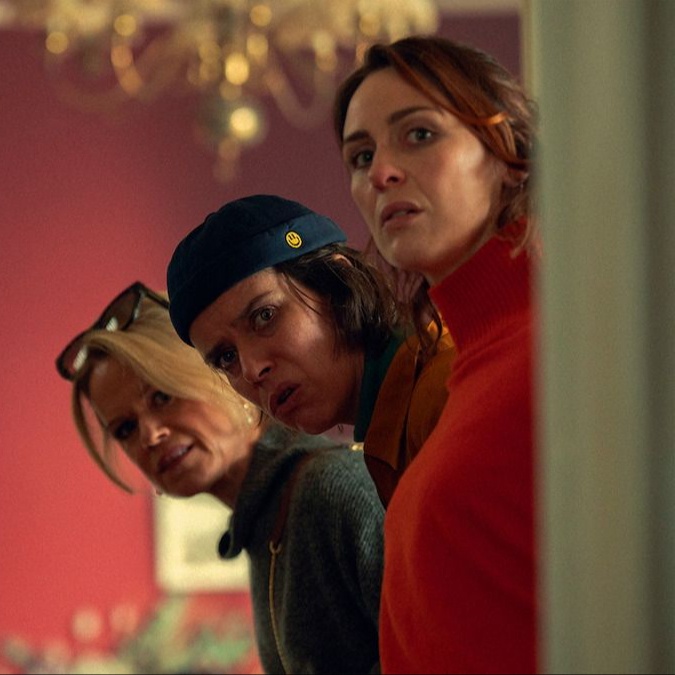When author Shelby Van Pelt appears on screen for our Zoom call, she’s seated in a warm, cosy writing room tucked inside her home just outside Chicago. It’s a space that feels as grounded and inviting as the story that put her on the literary map. The wall behind her is practically a shrine to Marcellus the Octopus, the breakout star of her debut novel, Remarkably Bright Creatures. You can count at least eight or nine pieces of fan art, drawings, paintings, even a crayon sketch, sent by readers from all over. “This one just came in last week,” she says, smiling as she picks up a watercolour of a particularly smug-looking octopus inspired by her novel. “They all have so much personality.”
And nestled among the fan tributes is a subtle but telling object: the backrest of a director’s chair, the kind you will spot on a movie set, leaning casually against the wall. It reads “Executive Producer” in white block letters, a nod to Van Pelt’s new role in the Netflix adaptation of Remarkably Bright Creatures, which is currently underway.
Published in 2022, Remarkably Bright Creatures is a tender, offbeat debut that sneaks up on you with its emotional resonance. Set in a sleepy town in the Pacific Northwest, it follows Tova Sullivan, a recently widowed woman in her seventies, who forms an unexpected friendship with an unlikely being: Marcellus, a grumpy but endearing, hyper-intelligent Pacific octopus living in the local aquarium. It’s a novel about grief, connection, and the small, strange ways we find our way back to ourselves with a dash of mystery, a touch of humour, and a lot of heart.
But what began as a quiet story about a woman and an octopus slowly transformed into a word-of-mouth sensation months after its release. It was picked up by readers on social media and came to be known simply as that octopus book. Even today, you can walk into nearly any bookstore, ask for it using just those three words, and the bookseller will know exactly what you mean. A financial consultant turned fiction writer, Van Pelt chats with us about how she went from consulting to crafting one of the most beloved novels in recent memory, why octopuses are her unlikely muse, and what it means to see her deeply personal story come alive on screen.
Excerpts from our conversation:
Where did the idea to write a story from an octopus’s point of view come from?
Truly, it came from an online burgeoning obsession. This was probably 10-plus years ago, before octopuses were as cool as they are now. I was trying to teach myself how to write. I don’t have a formal writing background; I’m a self-taught writer. I had another career before this and was burned out. One day, and I don’t even know how I got on this, I ended up on YouTube watching videos of captive octopuses that were being very naughty, misbehaving, trying to escape and squirting water at their handlers and throwing rocks at the glass and eating the other exhibits in the aquarium, and I got obsessed. I was like, this is the character I want to write.
Not too long after that, I took my first ever fiction class. One of the things that we did in that class was do this little writing exercise where we were asked to write from an unusual point of view. It was just a sheet of notebook paper, like one little scene. I wrote basically the first pages that became the first pages of the book of this octopus introducing himself, being very erudite and droll yet also snarky.
What made Marcellus the ideal lens to view human loneliness and connection?
I think one thing that’s interesting about Marcellus is that sometimes I forget he’s an octopus. That sounds weird, but I feel like he took on these very human traits. That relationship he has with Tova... It’s this unlikely friendship found at just the right time. It felt very human. And also, one of my favourite things about him is his curiosity. He’s trying to figure out how humans work. That came partly from my toddler, who was in that question-asking phase when I was writing this. I thought, what if an octopus were like that? A little judgy, a little grumpy but also fascinated with people.
What does the bond between Tova and Marcellus say about the kind of connection humans seek?
I think Tova really longs for someone to just listen to her without judgement. She has this group of friends that are called the Knitwits, one of my favourite things about the book. They really do care for her, but she is frustrated by her friends because they’re always trying to fix her. In Marcellus, what she finds, ironically, is someone who just listens without judgment. Marcellus is the judgiest character in the entire book, and yet, somehow, he comes to fill this role in Tova’s life of just being there for her and sort of absorbing what she’s willing to share. It’s funny because I feel like I have this relationship with my cats, who I’m convinced are judging me by the way they look at me.
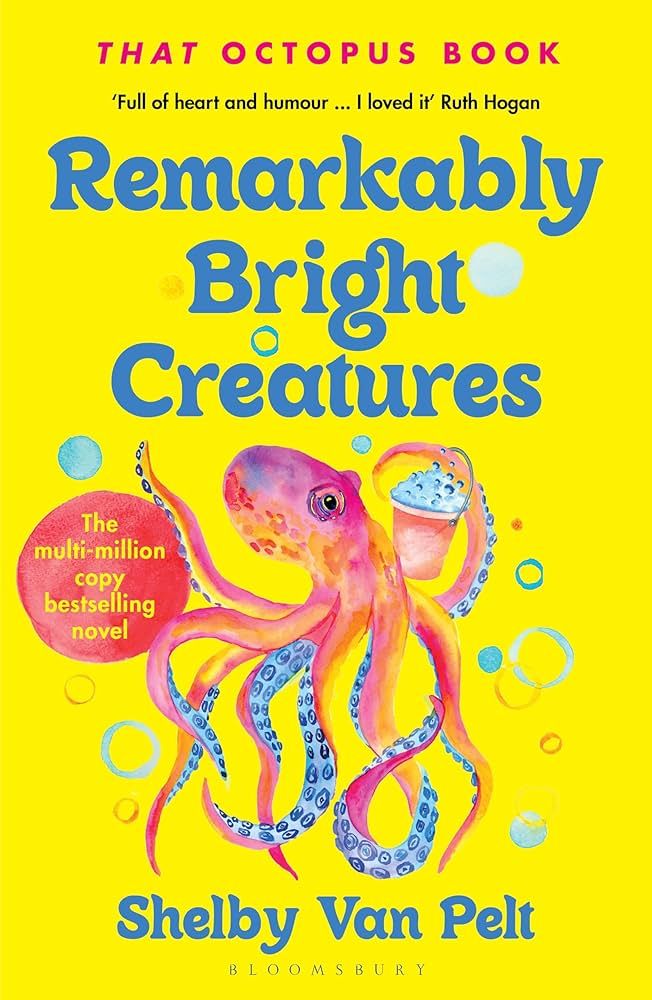
What about the ethical dilemma around aquariums?
Yeah, that was something I wrestled with while writing. On one hand, I didn’t want to glorify captivity. But then I also spent time talking to people who work in aquariums, and many of them really care deeply about conservation and education. So, I didn’t want to make it black and white. I wanted the reader to feel that tension and come to their own conclusions.
How did you gravitate toward an older, independent protagonist like Tova?
I’ve always loved older protagonists. Tova was inspired by my grandmother. Very stoic, sweet, but always busy, always “fine”. I think I was also trying not to write someone like me. Spoiler: I failed
So, there are aspects of the book that are autobiographical...
I grew up living next door to my grandmother and we were very close, and I think I just absorbed a lot of her mannerisms and outlook on the world. Like her, I struggle to let people in. I’m friendly but keep people at arm’s length. I also see myself in Cameron. He’s a man-child, but I relate to his fear of trying big things. I was a bit of a warm mess too.
And do you have a bit of Marcellus in you?
Sometimes people ask where that snarky voice came from, and, I don’t know, it just was in my head. I think I was a cranky old man in a previous life. Marcellus is my favourite character.
What kind of research went into writing Marcellus?
Initially, I did a lot of Googling. At first, I’d give myself five-minute limits so I wouldn’t fall into a rabbit hole. Later, I talked to marine biologists and octopus rescue folks to make sure I got the details right. Everything he does physically is something an octopus can actually do. The mind stuff is where I took liberties.
After all the success that this book won, do you feel the pressure to be online all the time?
A little bit. It’s something I’ve had to get used to. I’m not a digital native. I was on Facebook back in the day, but I wasn’t a social media person. I have a love-hate relationship with it. I love getting to hear from readers, and I try to reply when I can—and I always tell people that if you do get a reply, it’s from me. I don’t have anyone else doing that. But it’s a lot, and I can’t always keep up with it.
Did you ever think of any alternate endings?
[Spoiler alert] I played with it a lot. I always knew Marcellus would escape to the sea—I just didn’t know how. My favourite idea, which I wish had worked, was having the aquarium catch fire and burn down. In my naïve version, all the animals would just end up in the water and be fine.
But once I did real research, I realised the power would go out, life support systems would fail, and... yeah, everyone would die. So, that version didn’t make the cut. But I still kind of love the image of Marcellus dramatically fleeing a burning building.
What’s one writing myth you believed before you got published?
That you have to wake up at five in the morning to be a writer! I tried that for, like, three days. I am not a morning person. I write at night. I think that’s the biggest myth—that there’s only one right way to write.
What were you writing rituals?
Honestly, I’ve tried to de-ritualise it. Otherwise, I give myself excuses not to write. But I do tend to write best at night. Sometimes I light a candle or have some background music. But I try not to get too precious about it.
Which authors or books have shaped you the most?
Charlotte’s Web was probably my first favourite book. John Irving, Annie Hartnett, Kevin Wilson—I love books that are a little weird and funny but also hit you in the heart. That’s what I aspire to.
What’s the one book you’ve read and re-read?
The Westing Game by Ellen Raskin. It’s so clever. I re-read it every year. It’s like a masterclass in structure and storytelling.
And lastly, what are you reading right now?
I just finished Martyr! by Kaveh Akbar. It’s incredible. Heavy themes but very funny in parts. I really admire that balance.
